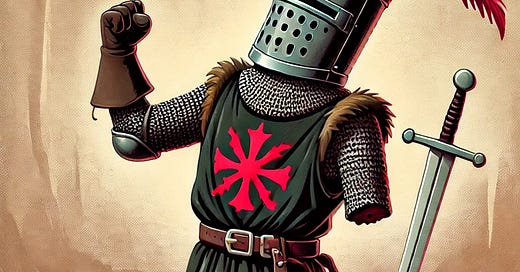If you believe in the importance of free speech, subscribe to support uncensored, fearless writing—the more people who pay, the more time I can devote to this. Free speech matters. I am a university professor suspended because of a free speech issue, so I am not speaking from the bleachers. The button below takes you to that story if you like.
Please subscribe and get at least three pieces /essays per week with open comments. It’s $5 per month and less than $USD 4. I know everyone says hey, it’s just a cup of coffee (with me, not per day but just one per month), but if you’re like me, you go, “Hey, I only want so many cups of coffee!” I get it. I don’t subscribe to many here because I can’t afford it.
But I only ask that when you choose your coffee, please choose mine. Cheers.
______________________________________________________________________
Is the recent election of Donald Trump in the United States and the surging support for Pierre Poilievre in Canada driven only by political and economic factors? Could one less discussed source of their appeal be a rejection of the “feminised” values embedded in progressive and “woke” identity politics?
Has the silent majority considered and rejected conventional media imaging and assumptions about masculinity? Is society finally saying enough? Are many exasperated with devaluing traditionally masculine qualities like assertiveness, competitiveness, and risk-taking?
But traditional feminism has more problems than Donald Trump; feminism is under attack, and gender warriors are flanking it with their artillery of post-modern truth - where truth is never absolute but a construction formed between competing interests. Gender identity is a construct now deemed fluid, with identity created through verbal assertions.
With trans females like Dylan Mulvaney, the concept of femininity is divorced from feminine values; embracing a caricature of female aesthetics and social behaviour, this simply distracts and pushes back on any celebration of the positive feminine values with the focus being on expanding identity politics to include biological men who aspire to become teenage cliches of femininity.
In a sociological sense, a “feminised” culture embraces values like inclusivity, emotional sensitivity, and empathy, all hallmarks of contemporary progressive discourse.
But does such an embrace need to come with a denial of traditional masculine values? The attack on men has been seen in both commercials and narratives, which paint men as inherently problematic or inferior.
Examples include:
Gillette’s “Toxic Masculinity” Campaign: In 2019, Gillette launched a controversial ad campaign that depicted traditional masculinity as synonymous with “toxic behaviour.”
Progressive Insurance Commercials: Some Progressive ads feature a character, “Dr. Rick,” who helps young people avoid becoming like their parents. Father figures are depicted as clueless, embarrassing, and out-of-touch.
Left-Leaning Organizations and Narratives: Much of academia and left-leaning institutions promote narratives that frame white males as a privileged or oppressive group, implying that any success they experience is a result of systemic unfairness rather than personal merit.
Note: Ironically, many Western believers who embrace the idea that masculine values are inherently toxic and advocate for their abandonment have made union with anti-zionist Muslim extremists, who, on the issue of gender equality, make Donald Trump seem like a fully feminised and woke crusader.
Bless their honest hearts - Hamas and other Iranian Muslim proxies are not shy about coming out and saying that women are reproductive machines whose role is to supply martyrs in their ongoing fight against Western civilisation and all that oppose the rise of a Muslim caliphate.
The cost of turning masculinity into a pejorative has hurt Western society.
Effects include:
Reduced Innovation and Risk-Taking: Masculine traits like competitiveness and risk-taking drive innovation, encouraging individuals to pursue ambitious goals and push boundaries. When society discourages these traits, fewer people may feel motivated to take bold steps that lead to technological, scientific, and entrepreneurial progress.
Decline in Physical and Mental Resilience: A society that downplays the importance of resilience may see a decline in people’s ability to endure hardships. Encouraging men to prioritise emotional vulnerability without balancing it with resilience can lead to increased mental health issues, as individuals may not develop the coping skills necessary for life’s challenges.
Erosion of Family and Community Structure: Traditional masculine roles within families—such as father figures who provide stability and discipline—play an essential role in healthy family dynamics. When men are encouraged to abandon these roles, families can lose the balance that a strong parental partnership offers, potentially impacting children’s development and well-being.
Economic Consequences: Traits like competitiveness and ambition, often associated with masculinity, drive economic growth and productivity. If these traits are undervalued, workplaces may become less efficient, and economic growth stagnates as fewer individuals feel compelled to strive for high levels of achievement.
This feminised approach in culture and politics often emphasises cooperation and non-confrontation. It is seen in policies advocating for “safe spaces,” limiting harmful speech, and focusing on collective identity over individualism. While these principles may foster inclusivity, detractors argue that they also inhibit open dialogue and reinforce a narrow moral framework.
In this sense, feminised culture can seem at odds with traditional notions of resilience, debate, and accountability.
This divide between feminised and masculinised values manifests in policies and social expectations, where one side advocates for compassion-driven policies while the other emphasises personal accountability.
Trump and Poilievre’s rejection of political correctness and identity-focused narratives resonates with those who feel stifled by the left's more sensitive cultural norms. Their rise suggests a collective desire for leaders who embody directness, toughness, and pragmatism.
For example, while well-intentioned, the insistence on moral conformity and inclusivity can lead to broader society, individual workplaces or academic institutions becoming what sociologist Erving Goffman called “total institutions,” where rigid norms restrict individuality. This perspective suggests that a feminised cultural approach, when dominant, risks creating an environment that silences dissent and discourages diverse perspectives.
We see this in Canada, where the Liberal and NDP parties push bills—always packaged nicely in bows and ribbons and affirmations of intentions to protect society—that end up being little more than internet censorship tools. A proposed NDP bill went as far as criminalising espousing anything positive about fossil fuels.
Perhaps people are tired of hearing the patronising messages of, “It’s for your own good,” which better translates to, “Shut up, and let us take control.”
The push for masculinised values can be seen as a reassertion of personal autonomy and resilience in the face of collectivist ideals.
Moreover, this cultural divide risks polarising society further as each side becomes more entrenched in its values. Thomas Sowell’s observation that “the most basic question is not what is best, but who shall decide what is best” speaks to the power struggle over cultural norms. Those drawn to Trump and Poilievre often feel that feminised values are being imposed upon society without consensus, leading to a sense of alienation and a call for change.
An appeal to strength and self-reliance resonates deeply with those who feel alienated by a feminised culture that they perceive as overly sensitive.
As political theorist Camille Paglia remarked, “A society that has lost contact with the masculine virtues of courage, risk-taking, and stoicism is on a path to social, cultural, and political decline.”
Furthermore, Sowell’s observation that “there are no solutions; there are only trade-offs” highlights the fundamental critique of woke politics, which often proposes sweeping changes in the name of social justice.
Sowell’s insight resonates with Trump and Poilievre supporters who feel that the cost of certain progressive policies—such as restrictions on speech or perceived limits on personal freedom—is too high and ignores the trade-offs required for societal stability.
The rise of Trump and Poilievre can also be seen as a symptom of broader cultural tensions. While feminised culture values emotional openness and inclusion, these leaders' masculinised culture emphasises individualism, resilience, and assertiveness.
Sowell’s critique of collectivist thinking reflects this divide. He argues, “If you are not prepared to use force to defend civilisation, then be prepared to accept barbarism.”
While controversial, such a statement underscores the appeal of a “harder” approach to governance and social issues, which Trump and Poilievre embody.
Supporters of Trump and Poilievre often view feminised cultural values as out of touch with reality, seeing them as overly protective and restrictive of individual freedoms. In this light, the political rise of these figures reflects a desire to push back against a culture that infantilises society.
As society navigates the tensions between feminised and masculinised values, the rise of these populist leaders suggests a call for balance. The cultural backlash against feminised values indicates a desire for leaders who embody strength, assertiveness, and independence.
Traits such as resilience, responsibility, and leadership provide stability and foster innovation, while media narratives that focus disproportionately on negative portrayals risk alienating men and dismissing their contributions.
Modern society's challenge is acknowledging and celebrating positive traits in both men and women, creating a balanced culture where all individuals, regardless of gender, can contribute meaningfully.
Perhaps we are seeing a push in a positive direction.
Please subscribe and get at least three pieces /essays per week with open comments. It’s $5 per month and less than $USD 4. I know everyone says hey, it’s just a cup of coffee (with me, not per day but just one per month), but if you’re like me, you go, “Hey, I only want so many cups of coffee!” I get it. I don’t subscribe to many here because I can’t afford it.
But I only ask that when you choose your coffee, please choose mine. Cheers.
______________________________________________________________________







